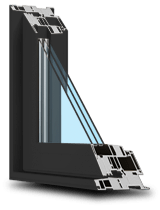Comprehensive Home Inspection Checklist: A Guide for Canadian Home Buyers
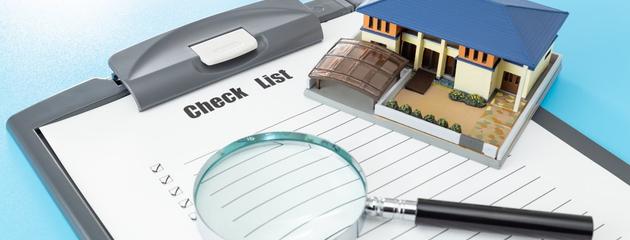
Buying a home is one of the most critical financial decisions Canadians make, and a thorough home inspection is your best tool for protecting that investment. A modern inspection goes far beyond a quick visual review — it evaluates the home as a complete system, covering structure, mechanical systems, safety devices, energy efficiency, and long-term durability.
Here’s what Canadian homebuyers should know upfront:
- A comprehensive inspection assesses the foundation, roof, exterior cladding, windows, doors, and drainage to detect structural or water-related issues.
- Interior systems — including plumbing, electrical, HVAC, insulation, and appliances — are checked for safety, functionality, and energy efficiency.
- Specialized inspections (radon, mould, sewer, well water) are increasingly recommended, especially for older or rural homes.
- The inspection report documents findings, prioritizes repairs, and helps buyers negotiate price adjustments or plan future maintenance.
- A professional inspector certified by CAHPI, OntarioACHI, or InterNACHI Canada ensures up-to-date knowledge of building standards and energy-efficient practices.
Key Takeaways
- A home inspection is a crucial step that enables buyers to understand a property’s structure, systems, safety risks, and long-term maintenance requirements.
- Modern inspections encompass an assessment of energy efficiency, ventilation, insulation quality, and moisture management, reflecting the updated expectations of Canadian building standards.
- Additional inspections — such as radon testing, mould evaluations, sewer line scans, and well-water testing — have become increasingly common in older and rural homes.
- A detailed inspection report can be used to negotiate repairs or pricing before finalizing the purchase agreement.
- Clear communication between the buyer, inspector, and real estate professional supports a smooth and informed decision-making process.
Hiring a Professional Home Inspector
The first and most crucial step in the inspection process is choosing a qualified inspector. In Canada, it is best to work with inspectors certified by recognized professional associations, including:
- CAHPI – Canadian Association of Home & Property Inspectors
- OntarioACHI – Ontario Association of Certified Home Inspectors
- InterNACHI – International Association of Certified Home Inspectors
These organizations uphold professional standards, require ongoing education, and ensure members are trained to evaluate modern homes using up-to-date tools and techniques.
“Experience matters. A good inspector should be able to explain not only what they see but also what it means for you as a homeowner.”
— Tony Wong, Project Manager
Understanding Home Inspection Costs in 2026
Home inspection costs vary depending on the location, age, and size of the property, as well as whether additional assessments are required.
Average Canadian Home Inspection Costs
| Property Type | Typical Price Range |
|---|---|
| Condominium / Small Townhome | $300–$450 |
| Detached Home (Standard Size) | $450–$650 |
| Larger / Older / Heritage Home | $650–$900+ |
| Add-On Services (each) | $80–$350 |
Additional inspections may include:
- Radon testing
- Mould assessment
- Sewer line camera scope
- Septic system evaluation
- Well-water quality testing
While these add costs, they often reveal critical information that can prevent significant future expenses.

What a Full Home Inspection Covers
A modern home inspection is far more comprehensive than a quick visual check. Inspectors evaluate the home as a connected system, where structure, moisture control, electrical safety, heating performance, ventilation, insulation, and water management all work together. A failure in any one area can affect comfort, long-term durability, and overall safety.
A complete inspection examines the exterior, interior, structure, major mechanical systems, safety components, and optional high-risk areas. The goal is to identify existing issues, potential risks, and elements nearing the end of their service life. Below is a detailed breakdown of what certified inspectors typically examine in Canada.
Exterior Inspection
The exterior inspection focuses on structural integrity, weather resistance, water management, and safety.
Roofing
Inspectors assess:
- Age and condition of shingles or roofing materials
- Signs of leaks, improper installation, or deterioration
- Chimney integrity
- Flashings, vents, gutters, and downspouts
Roof issues can lead to substantial repair costs, making this one of the most essential parts of an inspection.
Exterior Structure and Building Materials
This includes:
- Foundation condition
- Exterior walls (brick, stucco, siding, or mixed materials)
- Visible structural elements
- Signs of settlement, cracks, or shifting
Exterior wear can indicate larger structural or moisture issues.
Windows, Doors, and Siding
Inspectors evaluate:
- Frame condition
- Signs of rot, warping, or failed seals.
- Air leaks and drafts
- Operation of windows and doors
- Adequacy of exterior caulking
According to Helen Sin, Consumer Success Manager ,
“Ageing windows and exterior doors often reveal early signs of moisture intrusion. Even small gaps can lead to heat loss or water entry over time.”
Garage and Garage Door
For attached garages, inspectors examine:
- Door operation and safety features
- Fire separation walls and ceilings
- Structural integrity
- Presence of moisture or exhaust leaks
Grading and Drainage
Proper grading and drainage prevent water from collecting near the foundation. Inspectors assess how effectively the property manages surface water to minimize the risk of basement leaks and structural issues.
Yard Slope
They ensure that the soil slopes away from the home, allowing water to drain naturally outward rather than toward the foundation.
Downspout Direction
Inspectors confirm that downspouts discharge far enough from the house and aren’t directing water toward exterior walls or pooling areas.
Signs of Erosion
They look for washed-out soil, depressions, or staining that indicate poor drainage or long-term water accumulation.
Signs of Wood-Destroying Insects or Pests
Inspectors look for any evidence of insects or animals that can damage structural components or compromise the home’s integrity.
Carpenter Ant Activity
They check for frass (wood shavings), soft or hollow-sounding wood, and visible trails or nesting sites.
Termite Damage
Although uncommon in most of Canada, inspectors still look for mud tubes, damaged wood, or tunnelling in regions where termites may be present.
Rodent Entry Points
Inspectors look for gaps around vents, foundations, or utility lines where rodents could enter, as well as nesting material or droppings.
Evidence of Previous Infestations
They assess any old damage, treated areas, or repairs that may indicate past pest issues and verify whether the problem was resolved correctly.

Interior Inspection
The interior inspection focuses on the systems and structural elements that affect the home’s safety, durability, comfort, and long-term performance. Inspectors evaluate how well these components function together and identify issues that may require repair or further investigation.
Structural Integrity and Foundation
Inspectors check:
- Foundation cracks
- Floor levelness
- Wall alignment
- Load-bearing components
- Visible signs of structural movement
Structural concerns can significantly affect the home’s long-term value.
Electrical Systems
A modern inspection assesses:
- Main electrical panel and amperage
- Circuit breaker performance
- Wiring condition (copper, aluminum, or Knob-and-Tube)
- GFCI protection where required
- Grounding issues
- Unsafe or DIY electrical work
Electrical defects can pose fire hazards and often require immediate attention.
Plumbing and Water Systems
Inspectors review:
- Water supply lines
- Drainage pipes and flow
- Water pressure
- Evidence of leaks
- Condition of plumbing fixtures
- Age of piping (e.g., galvanized steel, Poly-B, copper, PEX)
Older piping systems may need replacement due to corrosion or prior leaks.
HVAC Systems
Inspectors evaluate:
- Furnace type and age
- Air conditioning unit
- Ductwork condition
- Ventilation quality
- Filter access
- Exhaust systems
Energy efficiency, indoor comfort, and safety depend on properly functioning HVAC systems.
Insulation and Ventilation
This includes checking:
- Attic insulation depth and type
- Vapour barriers
- Ventilation fans
- Attic airflow (soffit and ridge vents)
- Potential for mould growth
Moisture management is now a higher priority in 2026 due to rising humidity in several regions of Canada.
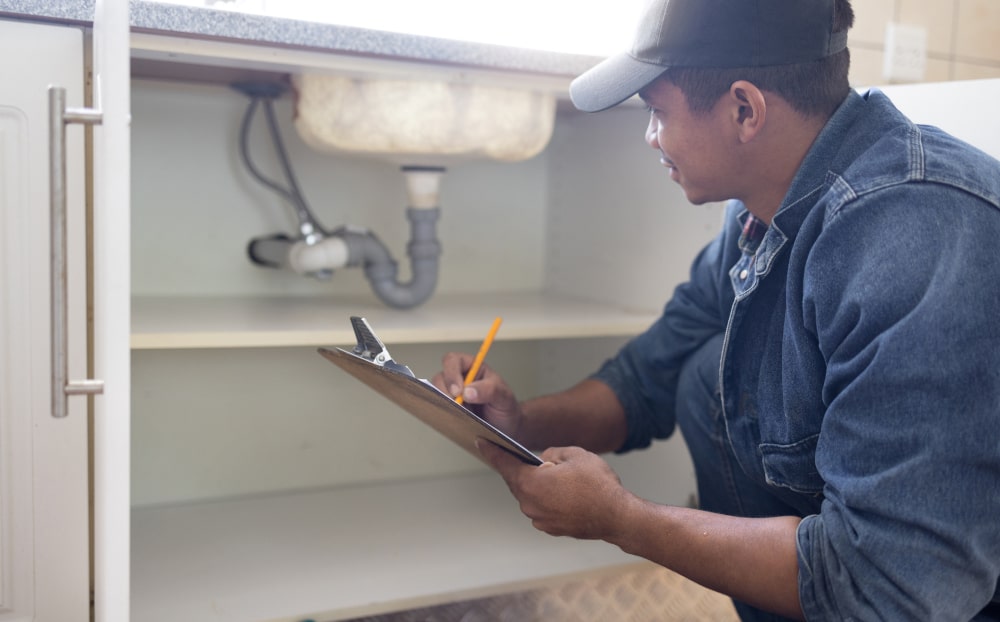
Water Heater and Appliances
As part of the interior inspection, the water heater and key built-in appliances are reviewed to ensure they operate safely and reliably. These components significantly impact daily comfort, energy efficiency, and long-term maintenance costs, so inspectors closely monitor their condition and performance.
Type of Water Heater
Inspectors identify whether the home uses an electric, gas, or tankless system. Each type has different efficiency levels, installation requirements, and potential safety considerations, such as gas venting or electrical load.
ge and Expected Lifespan
They check the manufacturing date and compare it to the typical service life of the unit. Most tank-style heaters last about 8–12 years, while tankless models can last significantly longer. An older unit may indicate that replacement should be planned soon.
Leaks, Corrosion, or Mineral Build-Up
Inspectors look for water pooling around the base, rust at connection points, corrosion on pipes or valves, and sediment buildup that may affect performance. These signs often point to wear, reduced efficiency, or impending failure.
Operation of Garbage Disposals
If the home includes a garbage disposal, the inspector tests its function and listens for unusual noise or vibration. They also check for leaks under the sink and ensure that wiring and plumbing connections are properly secured.
Safety Devices
Safety devices are a crucial component of any home inspection, as they directly impact occupant safety and protection. Inspectors verify that required systems are present, correctly installed, and functioning as intended.
Smoke Detectors
Inspectors confirm that smoke detectors are installed on every floor and near sleeping areas, and that each unit responds appropriately during testing. They also note expired or missing devices.
Carbon Monoxide Detectors
They check for the presence of CO detectors near bedrooms and in areas with fuel-burning appliances. Proper placement is essential for detecting harmful gas accumulation.
Placement and Functionality
Inspectors verify that detectors are positioned in accordance with local building codes and manufacturer guidelines. They also verify that batteries or wired systems are operational.
Fire-Rated Doors
If the home has an attached garage, inspectors look for a properly installed fire-rated door separating the garage from the interior living space. This door must close securely and provide adequate fire resistance.
Fire Separation
They review any required fire separation walls or ceilings, especially in multi-unit dwellings or homes with converted spaces, to ensure that repairs or renovations have not compromised these barriers.
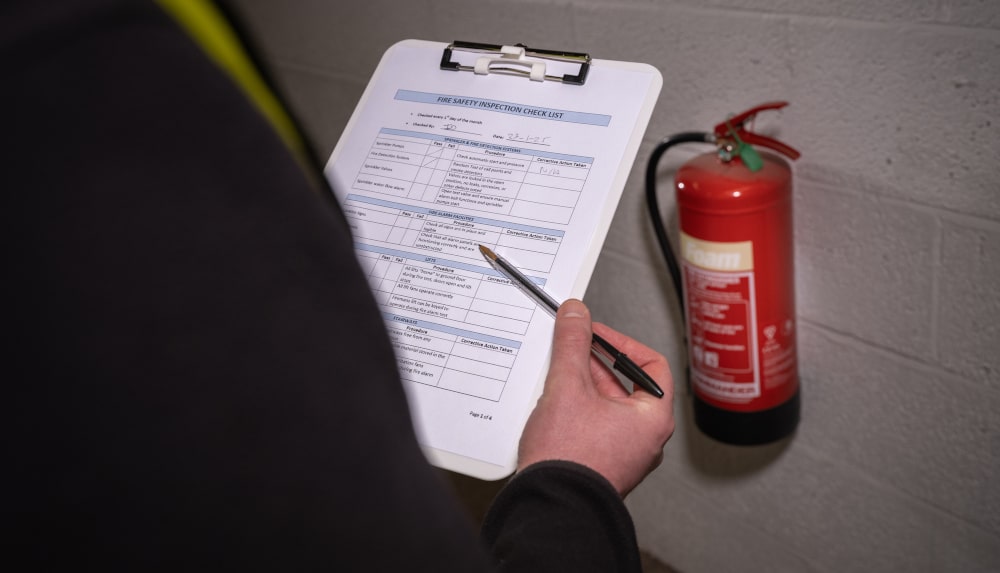
Interior Fixtures and Outlets
Inspectors review interior electrical components to ensure they are safe, properly installed, and functioning as intended. Even minor electrical issues can signal larger wiring concerns that may be hidden behind the walls.
Light Fixtures
Inspectors test all accessible fixtures to confirm they operate correctly and check for flickering, loose connections, or signs of outdated wiring.
Electrical Outlets
They examine outlets for proper grounding, physical damage, loose fit, or scorch marks. GFCI outlets in kitchens, bathrooms, and other required areas are tested for safety.
Switch Functionality
Inspectors check that all switches respond correctly, control the intended fixtures, and do not show signs of wear, buzzing, or delayed operation.
Evidence of Arcing or Overheating
They look for burnt odours, discolouration, heat marks, or melted components, which may indicate dangerous electrical faults requiring immediate attention.
Interior Pest or Insect Signs
Inspectors also check for signs of pests inside the home, as infestations can damage structural elements and create ongoing maintenance issues.
Tunnelling in Wood
They look for small holes, grooves, or channels in wood surfaces, which may indicate insect activity, such as that of carpenter ants or termites.
Droppings
Inspectors identify rodent or insect droppings, which help determine the type of pest and whether the issue is current or historical.
Nesting Materials
Shredded insulation, paper, or fabric found in hidden areas — such as attics, crawl spaces, or behind appliances — may signal rodent nesting.
Damp or Soft Wood
Inspectors check for areas of wood that feel damp, soft, or decayed, as moisture can attract pests and make structural components more susceptible to damage.
Major Systems and Core Components
A home’s performance and long-term comfort depend on several interconnected systems.
Heating and Cooling Systems
Inspectors review:
- Furnace efficiency
- AC operation and age
- Ductwork leaks
- Safety mechanisms
- Maintenance history
Plumbing and Sewer Systems
Key elements include:
- Water main shut-off
- Drainage performance
- Presence of tree root intrusion (older neighbourhoods)
A sewer scope may be recommended for older homes.
Electrical Panel and Wiring
This part focuses on:
- Panel age and safety
- Overheating signs
- Outdated wiring types
- Code compliance
Roof Certification (Where Applicable)
Some inspectors offer optional roof certifications outlining:
- Estimated life expectancy
- Repair recommendations
- Insurance-related considerations
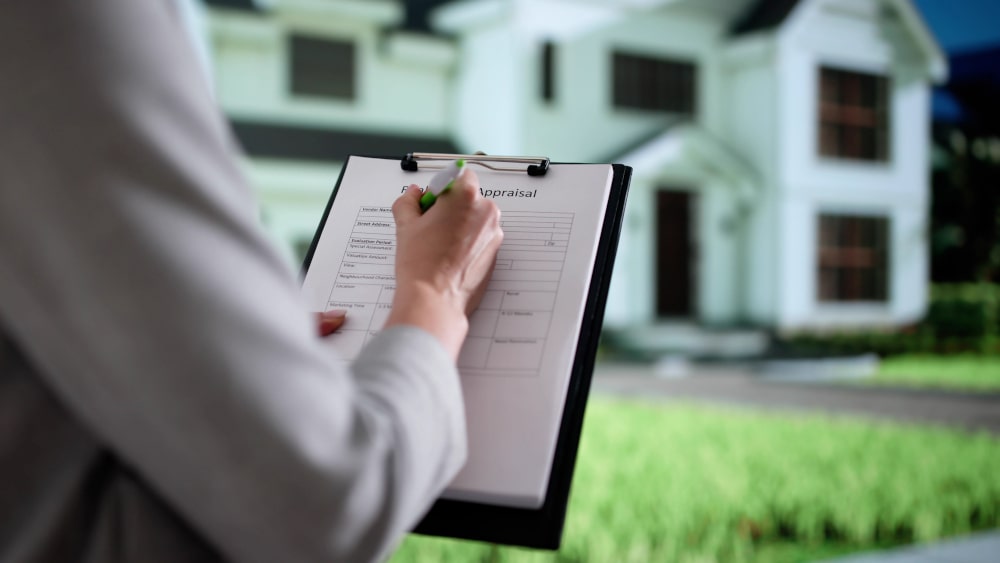
Additional Inspections That May Be Recommended
Some homes may require further specialized evaluation, depending on their age, location, and visible signs.
Lead Paint Testing
Relevant primarily for homes built before 1978.
Radon Testing
Radon is one of the leading environmental health concerns in Canada. Elevated levels may require mitigation.
Septic System Inspection
Important for rural homes not connected to municipal services.
Well Water Testing
Ensures safety, potability, and acceptable mineral content.
Mould Inspection
Mould exposure can pose health risks and indicate hidden moisture issues behind walls or in attics.
The Home Inspection Report
After completing the inspection, the inspector provides a detailed written report that includes:
- A summary of significant findings
- Photographs of issues
- Safety concerns
- Repair recommendations
- Estimated urgency (immediate, medium-term, or long-term)
Buyers should review the report with their real estate agent and consider:
- Whether repairs should be requested
- Whether a price reduction is appropriate
- Whether additional professional evaluations are needed
A clear understanding of the report supports confident decision-making before finalizing the purchase.
Post-Inspection Next Steps
After reviewing the inspection report, buyers decide how to move forward based on the home’s condition and the severity of any issues identified.
Proceed with the Purchase
If the inspection reveals only minor or typical maintenance items, buyers may choose to continue with the purchase as planned.
Negotiate Repairs
For issues that require attention — such as electrical updates, roof repairs, or plumbing fixes — buyers can request that the seller complete certain repairs before closing.
Request Credits or Price Adjustments
Instead of repairs, buyers may negotiate a price reduction or closing credit to cover the cost of future work.
Walk Away from the Deal
If major structural, safety, or moisture issues are found, and the seller is unwilling to negotiate, buyers may decide not to proceed with the purchase.
Follow-Up Inspections
Inspectors may recommend a secondary inspection after repairs or renovations to verify that deficiencies have been addressed correctly and that no new issues have appeared.
How a Thorough Home Inspection Protects Your Investment
A comprehensive home inspection helps buyers avoid unexpected repairs, understand the actual condition of a property, and plan future maintenance. It provides clarity, confidence, and peace of mind at a critical moment in the buying process.
At Canadian Choice Windows & Doors™ , we understand the importance of investing in a well-built, well-maintained home. High-quality windows and doors play a crucial role in enhancing comfort, improving energy efficiency, and ensuring long-term durability. If you are upgrading after your purchase, our team is here to help you choose products designed for Canadian homes and built to last.
Book a FREE consultation to learn how our windows and doors can support the comfort, performance, and value of your new home.
1000’s of Colours & Textured Finishes
Transform your home from ordinary to extraordinary with our new coloured and non-glare textured finishes. Available in a wide array of colours as well as custom matched colours for your very own personalized design.
Our Most Popular Replacement Window Colours:






